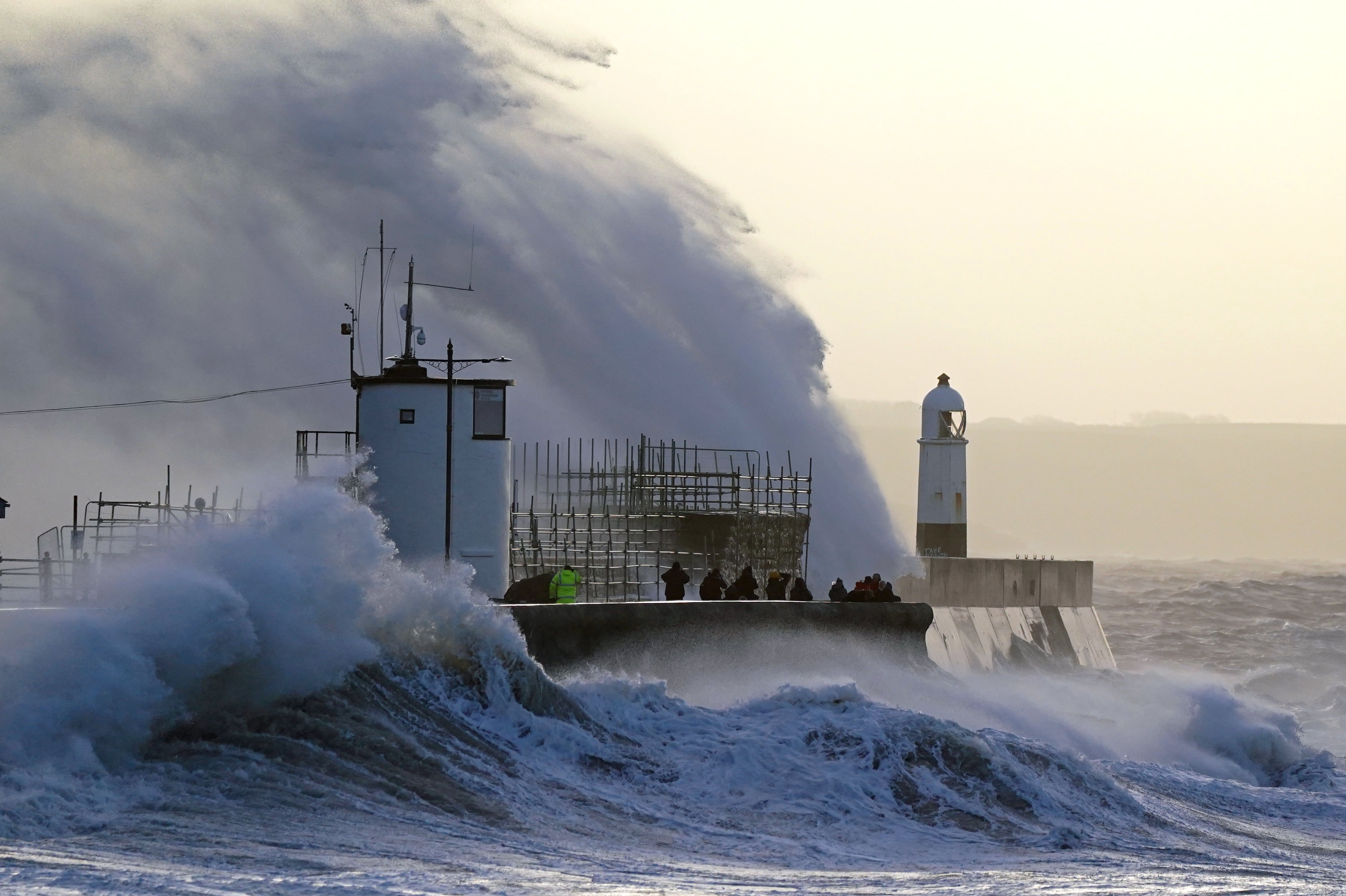Storm Eunice: People urged to stay at home amid 90mph winds across UK
The Met Office has issued two rare red weather alerts, with schools and businesses shut and the public transport network has been severely affected.

Your support helps us to tell the story
From reproductive rights to climate change to Big Tech, The Independent is on the ground when the story is developing. Whether it's investigating the financials of Elon Musk's pro-Trump PAC or producing our latest documentary, 'The A Word', which shines a light on the American women fighting for reproductive rights, we know how important it is to parse out the facts from the messaging.
At such a critical moment in US history, we need reporters on the ground. Your donation allows us to keep sending journalists to speak to both sides of the story.
The Independent is trusted by Americans across the entire political spectrum. And unlike many other quality news outlets, we choose not to lock Americans out of our reporting and analysis with paywalls. We believe quality journalism should be available to everyone, paid for by those who can afford it.
Your support makes all the difference.Millions of people have been urged to stay at home for the day, as one of the worst storms in a generation hits the UK.
Schools, roads and businesses have shut, with major disruption to the travel network due to concerns over flying debris caused by gusts of up to 90mph because of Storm Eunice.
Homes have been left without power, while the Met Office issued two ultra rare “red” weather warnings – from 7am until midday along the coastline of Devon, Cornwall and Somerset as well as the south coast of Wales, and from 10am until 3pm over the East of England and London – due to the combination of high tides, strong winds and storm surge.
And weather watchers have been urged to stay away from the coastline, with Roy Stokes from the Environment Agency describing travelling to take pictures in such hazardous conditions as “probably the most stupid thing you can do”.
A separate amber weather warning is also in place for gusts up to 80mph covering most of England from 5am to 9pm, as well as yellow warnings for snow in Scotland and Northern Ireland.
Prime Minister Boris Johnson wrote on Twitter: “We should all follow the advice and take precautions to keep safe.
“I thank responders for all their efforts.”
Home Office minister Damian Hinds said the Army is on “high readiness stand-by” to help.
He told Sky News: “We are strongly encouraging people to take precautions and make sure they stay safe.”
The Met Office added that the dangerous weather phenomenon known as a sting jet – a small area of highly intense wind inside a storm – could form later on Friday.
Met Office chief meteorologist Paul Gundersen said: “After the impacts from Storm Dudley for many on Wednesday, Storm Eunice will bring damaging gusts in what could be one of the most impactful storms to affect southern and central parts of the UK for a few years.”
The Met Office also took the unusual step of issuing a severe weather alert with National Highways for strong winds covering the whole of the country’s strategic road network from 6am to 6pm.
National Highways said high-sided vehicles and other “vulnerable” vehicles such as caravans and motorbikes could be blown over so should avoid bridges and viaducts.
National Highways head of road safety Jeremy Phillips urged those travelling to “plan your trip and take extra care, allowing more time for your journey”.
He said: “In high winds, there’s a particular risk to lorries, caravans and motorbikes so we’d advise drivers of these vehicles to slow down.”
Network Rail urged customers to avoid travelling on Friday, with many services either cancelled or delayed, and trains running at 50mph due to the increased risk of having to brake for debris on the track.
The main line through South Wales was also closed.
Major roads including the A66 cross-Pennine route and the M8 between Edinburgh and Glasgow were partially closed due to high winds on Friday morning before reopening later, while the Britannia Bridge connecting the island of Anglesey with mainland Wales has also been shut.
The M48 Severn Bridge is closed in both directions but the M4 Prince of Wales Bridge remains open, with the wind speeds “within operating limits”, a spokesman added.
P&O Ferries suspended all sailings between Dover and Calais, while the Sandbanks ferry connecting Poole in Dorset and Studland was also halted.
In the capital, Transport for London urged people to avoid non-essential travel on Friday.
A spokeswoman said: “We are also urging Londoners to please take care if they travel around the city.”
The Environment Agency has issued 10 severe flood warnings – eight along the Severn and two along the Wye – meaning there is a danger to life, as well as dozens of flood warnings and more than 100 flood alerts.
Western Power Distribution said more than 30,000 homes in the south west of England had no power as of 10am, with another 5,000 in Wales.
ESB said more than 6,000 people were without power due in the south of Ireland, predominantly in Cork and Kerry, on Friday morning.
Snow has already started to fall in pockets of Scotland, North Yorkshire and County Durham, but is expected to get much heavier and widespread.
Met Office forecaster Annie Shuttleworth told the PA news agency: “The whole of the country will be affected by the extremely strong and damaging winds, which will cause significant disruption.
“People will see significant delays to travel and power cuts, so you should avoid travelling if you can and stay at home when winds reach the highest speeds.
Several red warnings were issued in late February and early March 2018 during the so-called “Beast from the East”, the storm that brought widespread heavy snow and freezing temperatures to many parts of the UK.